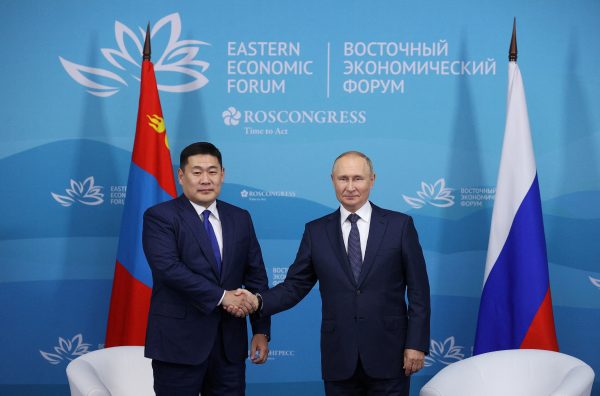Over the last three decades, Mongolia has maintained equidistant relations between China and Russia while strengthening its visibility in multilateral organisations and relations with third neighbours like Japan, India, the United States, Turkey, Germany, South Korea, Canada and Australia.
Historic concerns about China’s expansion mean that Mongolia naturally sees Russia as a security partner. But the 1930s Stalinist purges and over 70 years of subordination remind Mongolia to keep other friends close to reduce Russian influence over the country’s politics. Its flawed democracy serves as an ideological connection with the West and strengthens its identity vis-a-vis its authoritarian neighbours.
The war in Ukraine challenges this strategy. Political leaders and top diplomats in Ulaanbaatar have remained silent and strive to keep current ties with Russia unaffected by the war. Their main fear is Mongolia’s dependence on Russian fuel suppliers. Mongolia welcomed Russian Foreign Minister Sergey Lavrov in July 2022 and has continued all bilateral exchanges, including a joint military exercise.
Mongolia is also increasingly concerned about its relations with China. Mongolia’s economy is heavily dependent on China’s commodity imports and Chinese ports, roads and logistics connect it to global trade. For this reason, it is trying to avoid being caught in the middle of the US–China geopolitical contest. Economic issues overwhelmed bilateral talks during Chinese Foreign Minister Wang Yi’s visit to Mongolia in August 2022.
Mongolian leaders and businesses want to keep their ties with other countries without joining or endorsing sanctions against Russia. To this end, Mongolia has continued bilateral dialogues with third neighbours, welcomed foreign ministers from Japan and Poland, conducted a multilateral military exercise with the United States and Japan and hosted top NATO military leaders.
Instead of taking sides, Mongolia is pursuing multilateral diplomacy. It organised an international conference in June 2022 on strengthening the role of women peacekeepers attended by the UN Under-Secretary-General for Peace Operations Jean-Pierre Lacroix and over 60 female peacekeepers from 30 countries. Mongolia also hosted the first post-COVID-19 in-person international dialogue, the Ulaanbaatar Dialogue on Northeast Asian Security. Although North Korea missed the dialogue, it was well-attended by other international participants, including Russia.
UN Secretary-General Antonio Guterres visited Mongolia in early August 2022 to highlight the country’s commitment to strengthening its Nuclear-Weapon-Free Status. Since 1992, Mongolia has worked with the United Nations, the Non-Aligned Movement and like-minded supporters to be recognised as a single state Nuclear-Weapon-Free-Zone (NWFZ) by the UN Security Council’s five permanent members.
Mongolia’s silence on the Russo–Ukrainian conflict and active multilateralism are understandable given that the country’s security and economy largely depend on its two large neighbours. Russia’s actions against Ukraine remind Mongolians about their fuel, electricity and trade vulnerabilities. Fearing a hostile Russian response, the Mongolian public recently responded to allegations that a US bio lab was being established in Mongolia by demanding an official government denouncement.
Because of their historic ties with Ukraine, some Mongolians continue to express their objection to Russian military aggression despite being at odds with government officials. Attempts by different groups to manipulate public opinion have been ineffective as neither side has overwhelming support.
The majority of Mongolians appear to favour neutrality and public attitudes toward an increase in Russian visitors and Ukrainian expatriates remain normal. Only the state-owned Mongolian National Broadcasting backs Russia’s claim that the invasion is a special military operation — all other media outlets follow their own editorial policies. In Mongolia, pro-Russian posts dominate Facebook whereas pro-Ukrainian sentiment is common on Twitter.
Although the majority of Mongolians desire neutrality and the ruling party remains silent on the conflict, politicians from opposition parties continue to criticise the government and align with the Western world. It is hard to tell whether these are genuine calls for peace or simply politicians pursuing their own narrow interests. Whatever the reason, Mongolia is walking a tightrope while its people hope for a peaceful solution to the conflict.
Mendee Jargalsaikhan is Deputy Director and Dean at the Institute for Strategic Studies of Mongolia.
Ariunbold Tsetsenkhuu is Senior Researcher at the Institute for Strategic Studies of Mongolia.
Munkhtulga Batmunkh is Researcher at the Institute for Strategic Studies of Mongolia.


As a Mongolian, I don’t second this opinion column by Mongolian experts, in particular the fact that they included Turkey in the list of countries deemed as “third neighbor” for Mongolia. It is not only strategically risky but also it does not reflect the wider public opinion of ordinary Mongolian citizens. Turkey nowadays falsely and aggressively claims that Mongolia is an ancestral land of ancient Turks. It is very obvious that this opinion column reflects some foreign Mongolists, such as the author. Mongolia is a Northeast Asian country and should forge its foreign relations with both of its two neighbors-China and Russia but also with other Northeast Asian countries such as Japan, South-Korea, and North Korea.